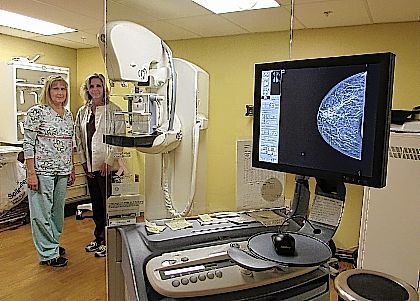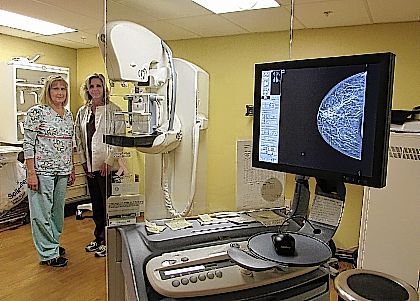

GREENVILLE – Wayne HealthCare has a new tool to help protect the women of the region from a potential killer. The new SenoClaire machine just went into service last week as a more effective means of detecting breast cancer.
The SenoClaire, from GE Healthcare, is a breast tomosynthesis machine designed with three-dimensional imaging technology that provides a more thorough image of breast tissue than traditional mammograms without increasing the patient’s exposure to radiation.
The machine, approved by the FDA in 2014, uses a low-dose short X-ray sweep around the positioned breast with nine exposures taken in incremental steps to produce cross sections of the breasts, both vertically and horizontally.
“We are pleased to be working with GE Healthcare to provide women with a precise screening tool to help detect breast cancer,” said Mike Mattheis, Director of Radiology at Wayne HealthCare. “When cancer is identified and treated early, we know women have a better rate of survival.”
The precise three-dimensional map provided by the images produced also allows further testing to be less invasive for the patient.
“Wayne HealthCare is committed to offering the community a complete suite of solutions – from screening and diagnosis through treatment and monitoring,” Mattheis said. “SenoClaire will offer our patients a new solution to help clinicians detect breast cancer with low-dose radiation and high image quality.”
A key challenge when performing screening mammography is keeping the radiation levels as low as possible. With the SenoClaire, there is no increase from a standard two-dimensional mammogram to a three-dimensional view, which means there is no increased radiation to patients during a SenoClaire breast exam.
“SenoClaire marks a significant step forward in helping our clinicians detect breast cancer,” said Jill Brown, Cancer Coordinator. “At Wayne HealthCare, our goal is to provide our patients with the most effective ways to battle cancer from every possible angle, with innovative procedures, medicines and technology.”
For women who do not have symptoms (such a lump detected through self-examination), pre-existing breast cancer or a medical or family history that puts them at high risk of breast cancer, the American College of Obstetricians and Gynocologists recommends getting annual mammograms beginning at age 40, but other groups disagree. The American Cancer Society recommends annual mammograms from age 45 to 54. The U.S. Preventive Services Task Force recommends biennial mammograms beginning at age 50, with exams starting at age 40 for those with higher risk factors.


